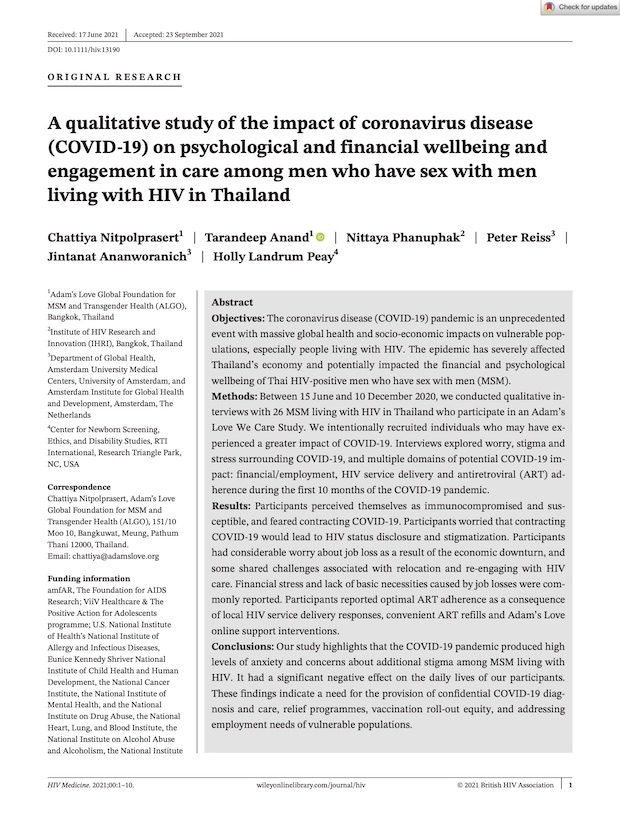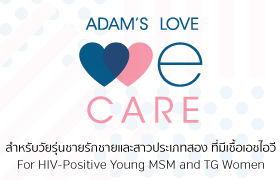|
|
A qualitative study of the impact of coronavirus disease (COVID-19) on psychological and financial wellbeing and engagement in care among men who have sex with men living with HIV in Thailand Chattiya Nitpolprasert 1 , Tarandeep Anand 1 , Nittaya Phanuphak 2 , Peter Reiss 3 , Jintanat Ananworanich 3 , Holly Landrum Peay 4 1 Adam's Love Global Foundation for MSM and Transgender Health (ALGO), Bangkok, Thailand.
2 Institute of HIV Research and Innovation (IHRI), Bangkok, Thailand.
3 Department of Global Health, Amsterdam University Medical Centers, University of Amsterdam, and Amsterdam Institute for Global Health and Development, Amsterdam, The Netherlands.
4 Center for Newborn Screening, Ethics, and Disability Studies, RTI International, Research Triangle Park, NC, USA.
https://onlinelibrary.wiley.com/doi/full/10.1111/hiv.13190 https://pubmed.ncbi.nlm.nih.gov/34634181/ Abstract Objectives: The coronavirus disease (COVID-19) pandemic is an unprecedented event with massive global health and socio-economic impacts on vulnerable populations, especially people living with HIV. The epidemic has severely affected Thailand's economy and potentially impacted the financial and psychological wellbeing of Thai HIV-positive men who have sex with men (MSM).
Methods: Between 15 June and 10 December 2020, we conducted qualitative interviews with 26 MSM living with HIV in Thailand who participate in an Adam's Love We Care Study. We intentionally recruited individuals who may have experienced a greater impact of COVID-19. Interviews explored worry, stigma and stress surrounding COVID-19, and multiple domains of potential COVID-19 impact: financial/employment, HIV service delivery and antiretroviral (ART) adherence during the first 10 months of the COVID-19 pandemic.
Results: Participants perceived themselves as immunocompromised and susceptible, and feared contracting COVID-19. Participants worried that contracting COVID-19 would lead to HIV status disclosure and stigmatization. Participants had considerable worry about job loss as a result of the economic downturn, and some shared challenges associated with relocation and re-engaging with HIV care. Financial stress and lack of basic necessities caused by job losses were commonly reported. Participants reported optimal ART adherence as a consequence of local HIV service delivery responses, convenient ART refills and Adam's Love online support interventions.
Conclusions: Our study highlights that the COVID-19 pandemic produced high levels of anxiety and concerns about additional stigma among MSM living with HIV. It had a significant negative effect on the daily lives of our participants. These findings indicate a need for the provision of confidential COVID-19 diagnosis and care, relief programmes, vaccination roll-out equity, and addressing employment needs of vulnerable populations.
Keywords: coronavirus disease (COVID-19); economic disparities; men who have sex with men; people living with HIV; severe acute respiratory syndrome coronavirus 2 (SARS-CoV-2).
© 2021 British HIV Association.
Research Funding
amfAR, The Foundation for AIDS Research
ViiV Healthcare & The Positive Action for Adolescents programme
U.S. National Institute of Health’s National Institute of Allergy and Infectious Diseases, Eunice Kennedy Shriver National Institute of Child Health and Human Development, the National Cancer Institute, the National Institute of Mental Health, and the National Institute on Drug Abuse, the National Heart, Lung, and Blood Institute, the National Institute on Alcohol Abuse and Alcoholism, the National Institute of Diabetes and Digestive and Kidney Diseases, and the Fogarty International Center
ACKNOWLEDGEMENTS
The authors gratefully acknowledge the participation of the MSM participants in the Adam’s Love We Care study. This study is an initiative of the Adam’s Love Global Foundation for MSM and Transgender Health with support from ViiV Healthcare, The Positive Action for Adolescents programme, and amfAR and through a grant from the US National Institute of Health’s National Institute of Allergy and Infectious Diseases, Eunice Kennedy Shriver National Institute of Child Health and Human Development, the National Cancer Institute, the National Institute of Mental Health, the National Institute on Drug Abuse, the National Heart, Lung, and Blood Institute, the National Institute on Alcohol Abuse and Alcoholism, the National Institute of Diabetes and Digestive and Kidney Diseases, and the Fogarty International Center as part of the International Epidemiology Databases to Evaluate AIDS (IeDEA; U01AI069907). The content is solely the responsibility of the authors and does not necessarily represent the official views of the above institutions.
How to cite
Nitpolprasert, C, Anand, T, Phanuphak, N, Reiss, P, Ananworanich, J, Peay, HL. A qualitative study of the impact of coronavirus disease (COVID-19) on psychological and financial wellbeing and engagement in care among men who have sex with men living with HIV in Thailand. HIV Med. 2021; 00: 1– 10. doi:10.1111/hiv.13190
|

















